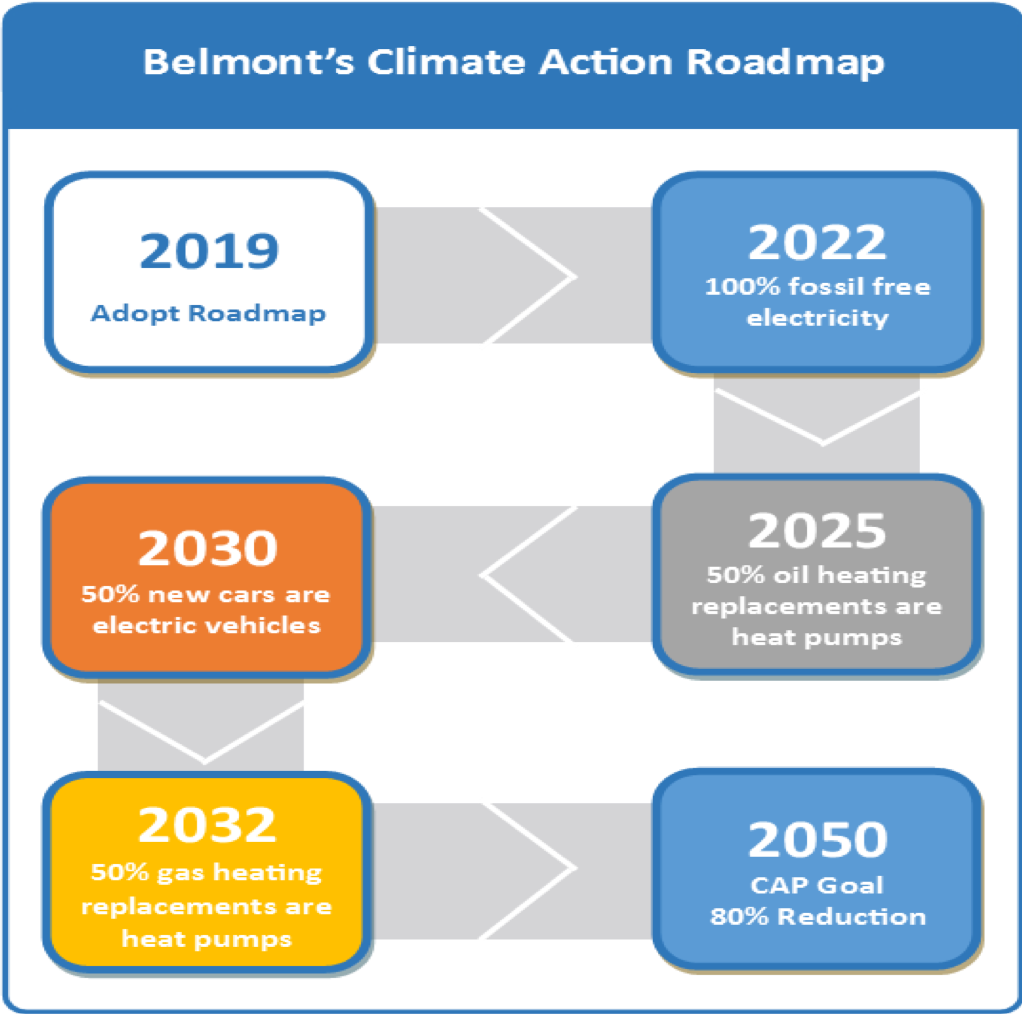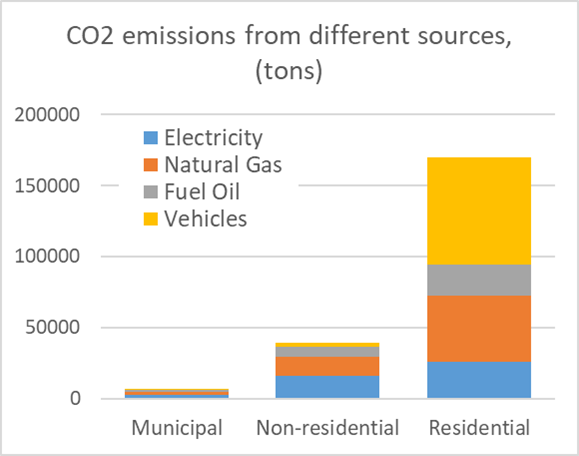By Roger Colton
The adage is timeless: think globally, act locally. On climate change issues, Belmont has taken that advice to heart. In 2009, a Belmont Special Town Meeting approved the goal of 80 percent emissions reduction by the year 2050. The following year, the Belmont Energy Committee was organized and appointed to pursue that goal.
In 2016, the committee examined the change in CO2 emissions between Belmont’s first greenhouse-gas inventory of 2007, and the most currently available data, 2014. They estimated that total emissions from electricity, transportation, and heating fuels declined by 5 percent in those seven years. Energy Committee member Dr. James Booth, a science teacher and author of the inventory, said the reduction was “promising, though not as large a decrease as needed to be on track for achieving Belmont’s long-term goals.”

The Energy Committee’s preliminary Roadmap aims to help the town meet its goal of reducing greenhouse gas emissions by 80 percent by 2050 (based on 2007 levels) by establishing measurable interim targets and identifying actions likely to have the most impact. (Belmont Energy Committee image)
Energy-efficiency projects featured heavily in Belmont’s climate action efforts for more than a decade. For instance, in 2006, the town contracted with an energy service company (ESCO) to implement energy improvements in 12 town buildings. (As with other such ESCO projects, the Belmont project was self-funded, with the firm hired to identify and install the energy reduction measures paying itself back through the resulting energy savings.) In 2011, Belmont joined many other Massachusetts communities in adopting the “stretch code,” which required new buildings to meet more stringent energy efficiencies than those in the standard state building codes. From 2015 to 2016, the Belmont Light Department operated a weatherization program to help residents better insulate their homes and avoid wasting energy; the program provided grants of up to $1,200 for 107 Belmont homes. Belmont also specified energy efficiency in the new Wellington elementary school, including an energy life-cycle cost analysis and modeling services to meet the state’s Collaborative for High Performance Schools efficiency standards; the analysis anticipated energy savings 48 percent above code.
More recently, Belmont initiated several energy-efficiency community campaigns. The Better Homes Belmont program signed up a larger percentage of homes to receive no-cost energy assessments than any other city or town in Massachusetts. Belmont Goes Solar, a volunteer-run effort to promote residential solar energy, added about 270 solar installations in two years. Belmont Drives Electric made Belmont a leader in electric vehicle (EV) adoption in Massachusetts, according to the state’s EV rebate site.
Despite these successes, former Energy Committee member Jenny Marusiak commented, “Belmont’s approach thus far has been piecemeal. Town volunteers, officials, and staff take on projects when they can, and without any overarching strategy to guide them. And although emissions are going down, this approach is not taking emissions down fast enough.”
Accordingly, the committee developed a comprehensive long-term plan titled, “Achieving Our Climate Action Plan: A Belmont Roadmap for Strategic Decarbonization,” or the Roadmap. Co-author Marusiak describes the Roadmap as “an aggressive strategy based on data and measurable targets.” The 2018 Roadmap has three specific, measurable goals for Belmont:
- To move Belmont Light to a 100 percent emission-free electricity supply by 2022.
- To electrify transportation, with 50 percent of new vehicle purchases to be EVs by 2030.
- To electrify home heating and cooling, with 50 percent of oil-fired furnace replacements changed to electric heat pumps by 2025, and 50 percent of gas-fired furnace replacements likewise changed by 2032.
These goals will allow periodic measurement of progress toward the objective of reducing emissions by 80 percent by 2050. Co-author Booth describes the Roadmap timelines as a “plausibly optimistic” way forward for Belmont.
Marusiak said, “The justifications for choosing an aggressive strategy are many. Fiscal responsibility is high on that list. Waiting to close the gap is expensive. The costs to Belmont residents and the town only increase with every year that investment opportunities are missed. Economic studies have shown that a steady and planned approach to reducing emissions is the most cost-effective.” This view is supported by a Harvard University study (“The Cost of Delaying Action to Stem Climate Change,” July 2014) cited in the Roadmap: “Because CO2 accumulates in the atmosphere, delaying action increases its concentrations … [and] the policy, when implemented, must be more stringent and thus more costly in subsequent years.”

Belmont measures its progress on the Climate Action Plan by comparing carbon emissions against a baseline emissions data from 2014, as shown in this chart, broken down by sector. While our electricity is getting cleaner due to the mix of resources used to power the New England grid, the Energy Committee has concluded that our overall efforts are not nearly enough. (Belmont Energy Committee image)
The Roadmap began with the 2016 inventory of the sources of Belmont’s emissions. According to that inventory, “a key takeaway . . . is that emissions from transportation and fossil fuels used for home and water heating are an enormous part of our carbon footprint. We cannot reach our goals without addressing these energy uses.”
In establishing a comprehensive plan to guide Belmont’s climate change response efforts for decades to come, the Roadmap concludes: “To reach Belmont’s climate goal, transportation and heating must become fossil fuel-free . . . Specifically, there is an emerging consensus that electrification of both transportation and home heating is the most likely path to reach our long-term climate goals. Why? Simply put, there exists a path to zero-carbon electricity through multiple existing technologies such as wind, solar, and others. While the appropriate mix of technologies remains an open question, there exist technically and economically feasible options. In contrast, fossil fuel-driven technologies like gasoline-powered cars can never get to zero emissions. Incremental gains in efficiency using fossil fuel-based technologies will simply not be enough to get us where we need to go.”
In May 2019, Town Meeting endorsed, by a vote of 196 to 14, both (1) the strategic direction (emission-free electricity from Belmont Light—electrification of heating and transportation)and (2) the timeline established by the Roadmap. The Town Meeting resolution acknowledged that “climate change is real, caused by humans, and affirmed by overwhelming scientific evidence.” The specific components of Belmont’s climate action Roadmap are explained throughout this newsletter.
Roger Colton is co-chair of the Belmont Energy Committee. He write the biweekly “Community Conversations” column for the Belmont Citizen Herald, produces a biweekly podcast of the same name for the Belmont Media Center, and is co-host of the BMC news program Belmont Journal.


Sorry, the comment form is closed at this time.